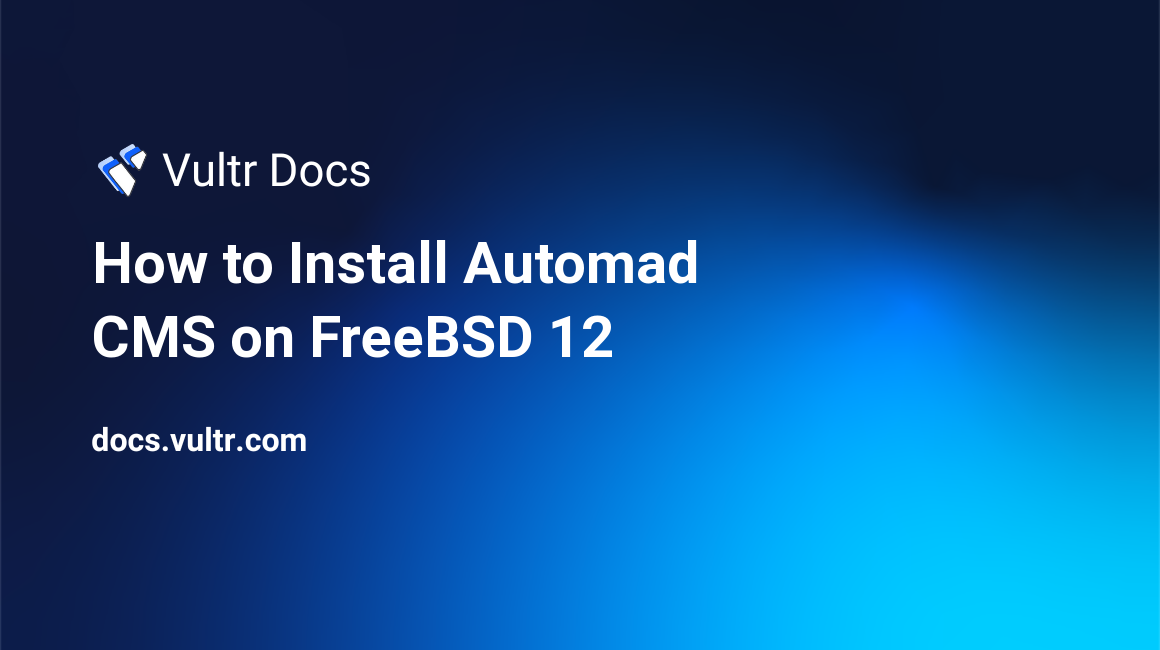How to Install Automad CMS on FreeBSD 12

Automad is an open source file-based content management system (CMS) and template engine written in PHP. The Automad source code is hosted on GitHub. This guide will show you how to install Automad CMS on a FreeBSD 12 Vultr instance.
Requirements
- PHP version 5.4 or higher.
- Web server software. In this guide, we use Nginx.
Before you begin
Check the FreeBSD version.
uname -ro
# FreeBSD 12.0-RELEASEEnsure that your FreeBSD system is up to date.
freebsd-update fetch install
pkg update && pkg upgrade -yInstall the necessary packages.
pkg install -y sudo vim unzip curl wget bash socat gitCreate a new user account with your preferred username. We will use johndoe.
adduser
# Username: johndoe
# Full name: John Doe
# Uid (Leave empty for default): <Enter>
# Login group [johndoe]: <Enter>
# Login group is johndoe. Invite johndoe into other groups? []: wheel
# Login class [default]: <Enter>
# Shell (sh csh tcsh nologin) [sh]: bash
# Home directory [/home/johndoe]: <Enter>
# Home directory permissions (Leave empty for default): <Enter>
# Use password-based authentication? [yes]: <Enter>
# Use an empty password? (yes/no) [no]: <Enter>
# Use a random password? (yes/no) [no]: <Enter>
# Enter password: your_secure_password
# Enter password again: your_secure_password
# Lock out the account after creation? [no]: <Enter>
# OK? (yes/no): yes
# Add another user? (yes/no): no
# Goodbye!Run the visudo command and uncomment the %wheel ALL=(ALL) ALL line, to allow members of the wheel group to execute any command.
visudo
# Uncomment by removing hash (#) sign
# %wheel ALL=(ALL) ALLNow, switch to your newly created user with su.
su - johndoeNOTE: Replace johndoe with your username.
Set up the timezone.
sudo tzsetupInstall PHP
Install PHP, as well as the necessary PHP extensions.
sudo pkg install -y php72 php72-mbstring php72-tokenizer php72-pdo php72-pdo_mysql php72-openssl php72-hash php72-json php72-phar php72-filter php72-zlib php72-dom php72-xml php72-xmlwriter php72-xmlreader php72-pecl-imagick php72-curl php72-session php72-ctype php72-iconv php72-gd php72-simplexml php72-zip php72-filter php72-tokenizer php72-calendar php72-fileinfo php72-intl php72-phar php72-soap php72-xmlrpcCheck the version.
php --version
# PHP 7.2.19 (cli) (built: Jun 20 2019 01:25:01) ( NTS )
# Copyright (c) 1997-2018 The PHP Group
# Zend Engine v3.2.0, Copyright (c) 1998-2018 Zend TechnologiesSoft-link php.ini-production to php.ini.
sudo ln -s /usr/local/etc/php.ini-production /usr/local/etc/php.iniEnable and start PHP-FPM.
sudo sysrc php_fpm_enable=yes
sudo service php-fpm startInstall Nginx
Install Nginx.
sudo pkg install -y nginxCheck the version.
nginx -v
# nginx version: nginx/1.14.2Enable and start Nginx.
sudo sysrc nginx_enable=yes
sudo service nginx startRun sudo vim /usr/local/etc/nginx/automad.conf and set up Nginx for Automad.
server {
listen 80;
server_name example.com;
root /usr/local/www/automad;
index index.php index.html;
client_max_body_size 100M;
location / {
try_files $uri $uri/ /index.php$is_args$args;
}
location ~ \.php$ {
fastcgi_index index.php;
fastcgi_pass 127.0.0.1:9000;
fastcgi_param SCRIPT_FILENAME $document_root$fastcgi_script_name;
include fastcgi_params;
}
}Save the file and exit.
Now we need to include automad.conf in the main nginx.conf file.
Run sudo vim /usr/local/etc/nginx/nginx.conf and add the following line to the http {} block.
include automad.conf;Test the configuration.
sudo nginx -tReload Nginx.
sudo service nginx reloadInstall Automad
Create a document root directory.
sudo mkdir -p /usr/local/www/automadChange ownership of the /usr/local/www/automad directory to johndoe.
sudo chown -R johndoe:johndoe /usr/local/www/automadNavigate to the document root.
cd /usr/local/www/automadUsing curl download the latest release of Automad CMS. Don't forget to bump up the version numbers if there is a newer release.
curl -O -J -L https://automad.org/downloadUncompress the zip archive.
unzip marcantondahmen-automad-6fff2a0456dc.zipMove all Automad files to the document root and remove zip archive.
mv marcantondahmen-automad-6fff2a0456dc/* . && mv marcantondahmen-automad-6fff2a0456dc/.* .
rm marcantondahmen-automad-6fff2a0456dc.zip
rmdir marcantondahmen-automad-6fff2a0456dcChange ownership of the /usr/local/www/automad directory to www.
sudo chown -R www:www /usr/local/www/automadAs the last step, create a user account to use the browser-based user interface called the Dashboard. Therefore navigate to https://yoursite.com/dashboard and follow the instructions.